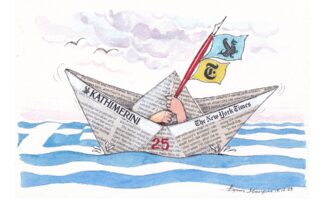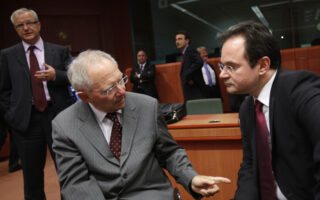The team behind the headlines

Fresh out of university and with vague career prospects, I was not a little awed as I crossed the threshold of the historic Greek newspaper’s old headquarters in downtown Athens on my first day at Kathimerini English Edition after weeks of making myself a nuisance to the editor in chief, Nikos Konstandaras, asking for a chance. The building on Sokratous Street was a gracefully aged edifice, with a creaky antique elevator and a system of pneumatic tubes providing a steady soundtrack of pffff-THUNKs as copy, photographs and memos were shot from one department to another on the cusp of the digital revolution. It was February 1, 1999, just shy of a year after the joint partnership between the International Herald Tribune and Kathimerini was launched on March 9, 1998.
I was immediately drawn to the newsroom energy and to the intelligence, wit and kindness of my new colleagues, some of whom would go on to help shape me and become steadfast friends. But what really struck me was the drive of common purpose and the realization that a newspaper is like the printing press that produces it, where every cog and wheel is essential.
This sense of team and teamwork has become a leitmotif running through my 24 years with Kathimerini English Edition. It has come in many guises, from the highest to the lowest level, starting with the IHT-New York Times and Kathimerini partnership that stuck by the paper through the 2008 global economic crisis, the 2009-2019 Greek economic crisis and the 2020-2022 Covid pandemic – events that brought other partnerships and much heftier publications to their knees.
As for the paper’s mission, it was clear: If the IHT was a window to the world and Kathimerini was Greece’s window to that world, where was the world’s window to Greece? That’s where Ekath stepped in, reporting on the news, on politics and the economy, on foreign affairs, on culture and the arts, and providing a balanced view of developments big and small in this country, with material from Kathimerini’s army of local journalists and commentators, and original material from our smaller international team.
More teamwork comes into play in this relationship with the Greek “mothership.” Ekath would not exist without it, but Kathimerini and its excellent journalists would also have missed the global outreach and opportunities that come from being translated into English.
Kathimerini also gave us the opportunity to be part of a major media organization, with an array of its own publications in Greek but also in English, like the excellent Greece Is, with partnerships such as that with Condé Nast for Vogue Greece and with a long list of corporate clients of the caliber of Aegean Airlines, Hotel Grande Bretagne and Costa Navarino – more teams, more synergies, to use a favorite term of the wonderful Elis Kiss. The embodiment of this synergy, she started out at the IHT in Paris before joining the Ekath team on day one and then moving on to become fashion features editor at Vogue Greece, staying in the Kathimerini clan. The existence of a strong English-language team at Ekath and the partnership with the NYT is to a significant degree what made some of these ventures possible.
What really struck me was the realization that a newspaper is like the printing press that produces it, where every cog and wheel is essential
Kathimerini English Edition never intended to be a community paper for English-speaking expats living in Greece. What it did, and does, and I hope successfully, is to convey local realities and trends to readers across the world. Its purpose became more than apparent when the eyes of that world turned on Greece for the Athens 2004 Olympics. A successful Games was followed by a period of euphoria, which for our team went on to mean growth and expansion with the weekly Athens Plus. It was a great ride that lasted from June 2008 until it came to an abrupt and painful end in December 2010. Yet it was during the Greek financial crisis that Ekath really served a “national mission,” for want of a better term.
Its presence became more important than ever in 2009-2019, when Greece was being vilified in a lot of the international media as a wasteful, corrupt, ne’er-do-well, and Greeks depicted as lazy leeches looking for handouts. After being given a crash course in economic jargon by our vastly talented deputy editor Nick Malkoutzis, our job was to acknowledge the indisputable failings that put us in the position of needing bailouts to avert a complete economic collapse, but also to shine a spotlight on the crippling impact of austerity on Greek society and on that society’s formidable efforts to survive with grit and creativity, in opposition to the more violent and extreme manifestations of widespread frustration stoked by deprivation and hopelessness. While the crisis elevated Ekath’s purpose, it was also a storm that swept up Athens Plus and scattered our small “family” asunder, halving it in size.
Kathimerini English Edition has always been a family in every sense of the term, thanks to the climate fostered from the start by Kathimerini’s late owner Aristides Alafouzos, Ekath’s first editor in chief and my “jobfather,” Nikos Konstandaras, and the indomitable Diane Shugart, his number two. The latter two took a personal interest in our professional growth, whipped our first forays into journalism and translation into shape to show us how it’s done and instilled in us a work ethic and professional standards that still guide us today. This philosophy was more than ably represented by Nick Malkoutzis and Niki Kitsantonis in the years that followed.
Occasionally dysfunctional but fiercely loyal, the Kathimerini English Edition family has known its share of terrible sadness but also of great joy. We have danced together and laughed together – there has been a lot of both – and forged lifelong friendships based on unwavering trust and mutual respect. But we have also wept together in our darkest hours and stood by one another in personal crises; I am still touched by the incredible generosity of Kathimerini and my colleagues who allowed me to take a six-month leave of absence to care for an ailing parent. When Athens Plus was shut down, we sat huddled in the cafeteria and cried, but we dried our eyes and went back downstairs, as a team, to put the final issue to bed – not one of our colleagues who had just been made redundant walked away from the task at hand, as many would.
This incredible sense of solidarity was also reinforced from the top, like during the deadly September 7, 1999 earthquake, which struck shortly before 3 p.m. when the newspaper was starting to get busy. As soon as the dust settled and we returned to our desks to get on with the job, Themis Alafouzos, still waiting to hear that his own wife and children were OK, visited each department to ask after the staff and their families and to offer the company’s support where it may be needed.
As we hobbled out of the financial crisis, licking our wounds and counting our losses but still alive, Kathimerini English Edition embarked on a new chapter in its history, adapting to the realities of a rapidly changing media landscape and the need to reach out to a wider audience under the stewardship of Kathimerini’s experienced executive editor, Alexis Papachelas, and a new hand at the helm, Tom Ellis.
We entered a new period of euphoria as Greece started to recover from the financial crisis and Kathimerini celebrated its centennial in 2019, ringing in the New Year in January 2020 with a rager of a party. It was probably the last time in more than two years that many of us would hug our friends and find ourselves dancing in a room full of people. But we survived the Covid pandemic too, thanks to Kathimerini’s commitment to keep the show going, thanks to its crack team of techies who made the ungainly process of working remotely run smoothly, and thanks, as always, to the team.
Today, 25 years after the partnership’s launch, the relationship is holding strong, Greece is firmly on the path of growth and Kathimerini is investing anew, this time focusing on further expanding the digital edition, ekathimerini.com. We already have a solid team forming the basis of this new effort, with other “old-timers” like myself – our intrepid copy-editor and proofreader Deborah Ellis, our ethical compass and rock Harry van Versendaal, our tireless and always reliable business and sports editor George Georgakopoulos, the walking encyclopedia that is Demetris Nellas, and the inexhaustible font of satire, cartoonist Ilias Makris – and the later additions of Paris Ayiomamitis, Daphne Papadopoulou and Damian Mac Con Uladh, all three experienced journalists who fit into the team like the missing pieces of a puzzle. We have also welcomed bright young journalists into the growing fold, like Constantine Capsaskis and, most recently, Lida Katsanouli, and are looking forward to new additions in the months ahead.
As the Kathimerini English Edition family grows again, I hope we can make its new members feel as excited to be part of the team as I was 24 years ago, and that the presses keep pumping.





